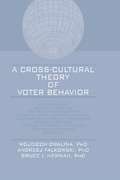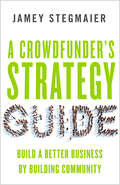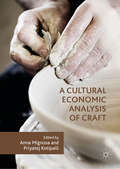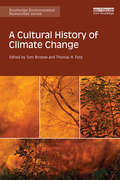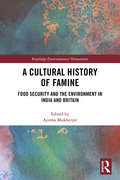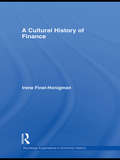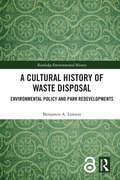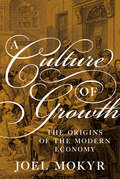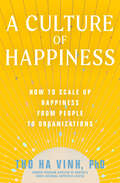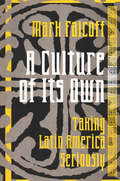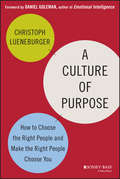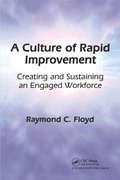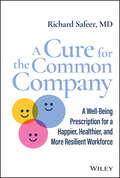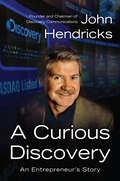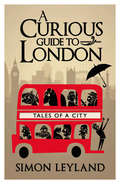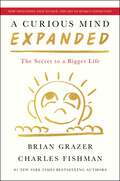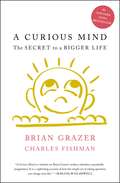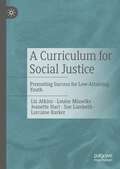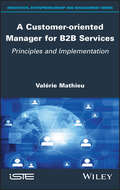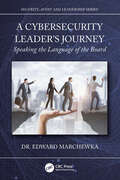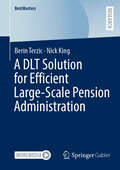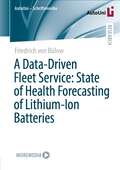- Table View
- List View
A Cross-Border-Only Regulation for Consumer Transactions in the EU: A Fresh Approach to EU Consumer Law (SpringerBriefs in Business)
by Christian Twigg-FlesnerFor almost three decades, the European Union (EU) has adopted measures to regulate consumer transactions within the internal market created by the EU Treaties. Existing legislation is largely based on directives harmonizing aspects of national consumer laws. This Brief argues that a more appropriate approach for EU consumer law would be legislation in the form of a regulation which is applicable to cross-border transactions only. The author considers the constitutional constraints of the EU Treaties, before examining the case for a cross-border-only measure. He argues that the cross-border approach is preferable, because it would provide clearer benefits for consumers seeking to buy goods and services across borders, while not upsetting domestic law unnecessarily--in particular in the context of e-commerce, with implications for industry, policymaking, and regional development. The Brief concludes by suggesting that a successful EU measure on cross-border consumer transactions could create a template for global initiatives for transnational consumer law.
A Cross-Cultural Theory of Voter Behavior
by Bruce I Newman Wojciech Cwalina Andrzej FalkowskiThe rapid development of democracy and political freedoms has created new and sophisticated psychology-based methods of influencing the way voters choose, as well as political systems based on free market principles. A Cross-Cultural Theory of Voter Behavior uses advanced empirical testing to determine whether the behavior of voters in established and emerging democracies around the world is predictable. The results of the testing suggest the theory is a ground-breaking cross-cultural model with theoretical and strategic global implications. This unique book examines the many facets of political marketing and its direct relationship with the voter. A comprehensive theory meticulously tested in the dynamic political waters of the U.S. and Europe, this text bridges the latest theoretical developments in the emerging and advanced democracies. A Cross-Cultural Theory of Voter Behavior offers an innovative and seldom seen international perspective that integrates up-to-date literature in political science with advanced political marketing to provide readers with useable, unified information. In addition, the text is replete with detailed references and illustrated with a wealth of informative tables and graphics to made pertinent data accessible and easily understood. Some of the topics discussed in A Cross-Cultural Theory of Voter Behavior include politics in an age of manufactured images, partisanship and party identification, candidate-centered politics, political cognition, social categorization of politicians, the role of advertising and emotion, among others. An ideal text for students, academics, and researchers, the information presented in A Cross-Cultural Theory of Voter Behavior is also a vital resource for political practitioners such as consultants, candidates, lobbyists, political action committees, fund-raisers, pollsters, government officials, ad specialists, journalists, public relations executives, and congressional aides.
A Crowdfunder's Strategy Guide: Build a Better Business by Building Community
by Jamey StegmaierMore Than MoneyJamey Stegmaier knows crowdfunding. He's a veteran of seven successful Kickstarter campaigns (and counting) that have raised over $3.2 million, and he's the proprietor of the widely read Kickstarter Lessons blog. In this book he offers a comprehensive guide to crowdfunding, demonstrating that it can be a powerful way for entrepreneurs to grow their businesses by building community and putting their customers first.This book includes over forty stories of inspiring successes and sobering disasters. Stegmaier uses these examples to demonstrate how to (and how not to) prepare for a campaign, grow a fan base, structure a pitch, find new backers, and execute many other crucially important "nuts and bolts" elements of a successful crowdfunding project.But Stegmaier emphasizes that the benefits of crowdfunding are much more about the "crowd" than the "funding." He shows that if you treat your backers as people, not pocketbooks—communicate regularly and transparently with them, ask their opinions, attend to their needs—they'll become advocates as well as funders, exponentially increasing your project's chances of succeeding.
A Cultural Economic Analysis of Craft
by Anna Mignosa Priyatej KotipalliAre we aware of the values of craft? In this edited volume, cultural economists, researchers and professionals provide an interdisciplinary discussion of the relevance and contribution of the craft sector to the economy, as well as to society at large. Mignosa and Kotipalli bring together contributors to compare the craft sector across countries, analysing the role of institutions, educational bodies, organisations and market structure in its evolution and perception. The Western approach to craft and its subordinate position to the arts is contrasted with the prestige of craftmanship in Eastern countries, while the differing ways that craft has attracted the attention of policy agencies, museums, designers and private institutions across regions is also analysed. This volume is vital reading to those interested in the economic features of craft and craftsmanship around the world, as well as for those interested in the importance of policy in bringing about effective sustainable development.
A Cultural History of Climate Change (Routledge Environmental Humanities)
by Tom Bristow Thomas H. FordCharting innovative directions in the environmental humanities, this book examines the cultural history of climate change under three broad headings: history, writing and politics. Climate change compels us to rethink many of our traditional means of historical understanding, and demands new ways of relating human knowledge, action and representations to the dimensions of geological and evolutionary time. To address these challenges, this book positions our present moment of climatic knowledge within much longer histories of climatic experience. Only in light of these histories, it argues, can we properly understand what climate means today across an array of discursive domains, from politics, literature and law to neighbourly conversation. Its chapters identify turning-points and experiments in the construction of climates and of atmospheres of sensation. They examine how contemporary ecological thought has repoliticised the representation of nature and detail vital aspects of the history and prehistory of our climatic modernity. This ground-breaking text will be of great interest to researchers and postgraduate students in environmental history, environmental governance, history of ideas and science, literature and eco-criticism, political theory, cultural theory, as well as all general readers interested in climate change.
A Cultural History of Famine: Food Security and the Environment in India and Britain (Routledge Environmental Humanities)
by Ayesha MukherjeeThe term "food security" does not immediately signal research done in humanities disciplines. It refers to a complex, contested issue, whose currency and significance are hardly debatable given present concerns about environmental change, resource management, and sustainability. The subject is thus largely studied within science and social science disciplines in current or very recent historical contexts. This book brings together perspectives on food security and related environmental concerns from experts in the disciplines of literary studies, history, science, and social sciences. It allows readers to compare past and contemporary attitudes towards the issues in India and Britain – the economic, social, and environmental histories of these two nations have been closely connected ever since British travellers began to visit India in the latter half of the sixteenth century. The chapters in this book discuss themes such as climate, harvest failure, trade, technological improvements, transport networks, charity measures, and popular protest, which affected food security in both countries from the seventeenth century onwards. The authors cover a range of disciplinary and interdisciplinary approaches, and their chapters allow readers to understand and compare different methodologies as well as different contexts of time and place relevant to the topic. This book will be of great interest to students and researchers of economic and social history, environmental history, literary studies, and South Asian studies.
A Cultural History of Finance (Routledge Explorations In Economic History Ser.)
by Irene Finel-HonigmanThe world of finance is again undergoing crisis and transformation. This book provides a new perspective on finance through the prism of popular and formal culture and examines fascination and repulsion toward money, the role of governments and individuals in financial crises and how the Crisis of 2008, like others since 1720, repeat the same patterns of enthusiasm, greed, culpability, revulsion, reform and recovery. The book explores the political and socio-economic factors which determine fallibility and resilience in financial cultures, periods of crisis, transition and recovery based on cyclical rather than linear progression. Examining the roots of financial capitalism, in Europe and the United States and its corollary development in Asia, Russia and emerging markets proves that cultural and psychosocial reactions to financial success, endeavor and calamity transcend specific periods or events. The book allows the reader to discover parallel and intersecting reactions, controversies and resolutions in the cultural history of financial markets and institutions.
A Cultural History of Waste Disposal: Environmental Policy and Park Redevelopments (Routledge Environmental History)
by Benjamin A. LawsonThis book offers a historical analysis of landfill sites in New York City, Greater Toronto, and Greater Tel Aviv, and uses them as case studies to emphasize the international and global scale of issues concerning waste disposal and park redevelopments.New York, Toronto, and Tel Aviv are currently redeveloping giant landfills into parks to much fanfare. The park redevelopments may be seen as an attempt to erase or assuage the decades of problematic waste-disposal policy that led to the creation of such large landfills. Booster rhetoric underscores this point, such as promoting how the parks will be a “green lung” for the city. This book contextualizes these redevelopments by offering a historical analysis, providing a greater understanding of the past, current, and future potential issues. It goes on to analyze the language and media coverage surrounding former waste sites becoming park redevelopments, including how cities use art to promote their image and gain cultural relevance. By engaging with both the works of waste historians and literature on waste and discard studies, the book provides theoretical models for analyzing the role of power in municipal systems, as well as human and ecological impacts on waste. It concludes with an analysis of the features necessary for landfill parks to be successful. This book will be useful for scholars, researchers, and academics studying waste studies, the environment, cities, and sustainable development, as well as for policymakers and environmental/eco artists.
A Cultural Transformation at Southeastern Grocers
by Suraj Srinivasan Jonah S. Goldberg Joseph A. PaulCase
A Culture of Growth: The Origins of the Modern Economy
by Joel MokyrDuring the late eighteenth century, innovations in Europe triggered the Industrial Revolution and the sustained economic progress that spread across the globe. While much has been made of the details of the Industrial Revolution, what remains a mystery is why it took place at all. Why did this revolution begin in the West and not elsewhere, and why did it continue, leading to today's unprecedented prosperity? In this groundbreaking book, celebrated economic historian Joel Mokyr argues that a culture of growth specific to early modern Europe and the European Enlightenment laid the foundations for the scientific advances and pioneering inventions that would instigate explosive technological and economic development. Bringing together economics, the history of science and technology, and models of cultural evolution, Mokyr demonstrates that culture--the beliefs, values, and preferences in society that are capable of changing behavior--was a deciding factor in societal transformations. Mokyr looks at the period 1500-1700 to show that a politically fragmented Europe fostered a competitive "market for ideas" and a willingness to investigate the secrets of nature. At the same time, a transnational community of brilliant thinkers known as the "Republic of Letters" freely circulated and distributed ideas and writings. This political fragmentation and the supportive intellectual environment explain how the Industrial Revolution happened in Europe but not China, despite similar levels of technology and intellectual activity. In Europe, heterodox and creative thinkers could find sanctuary in other countries and spread their thinking across borders. In contrast, China's version of the Enlightenment remained controlled by the ruling elite.Combining ideas from economics and cultural evolution, A Culture of Growth provides startling reasons for why the foundations of our modern economy were laid in the mere two centuries between Columbus and Newton.
A Culture of Happiness: How to Scale Up Happiness from People to Organizations
by Tho Ha VinhPractical principles for creating conditions for happiness at scale from the program director of the Gross National Happiness Center of Bhutan, the only country in the world to measure progress by the happiness of its citizens.Despite countless happiness programs focused on individual well-being, are we any happier, really? Is it in fact possible to be fully happy within a miserably dysfunctional society built to keep structures of inequity in place? Possible, perhaps, but not easy. While the pursuit of happiness is a much-celebrated ideal, how can countries and communities design the right environments for people to lead happy lives? Personal programs for happiness that include mindfulness, empathy, and gratitude are a good start, but without structural changes, they can only go so far. Taking the case of the country of Bhutan as an example, the nation's first Gross National Happiness program director Tho Ha Vinh explains how the principles of happiness can and must apply to people, families, and communities at scale to produce the conditions for a truly satisfying life. More and more people feel that we live in a time of transition and that our very survival on this planet depends on renewing the way we live together in society. Gross National Happiness is an innovative development paradigm that puts the interconnected happiness of all people and the well-being of all life forms at the center of progress. Based on real-life experiences, this book shows a multitude of practical methods for strategic thinkers and change makers to apply the framework of Gross National Happiness to bring about positive change in schools, businesses, and communities.
A Culture of Its Own: Taking Latin America Seriously
by Mark FalcoffA Culture of Its Own: Taking Latin America Seriously presents Mark Falcoff's essays on the region. Many of them are contentious; none of them are dull. He ranges from bilingualism to the cult of Garcia Lorca, from U.S.-Cuban relations to Chile's curious love affair with Germany. On more than one occasion, Falcoff takes aim at American journalism and scholarship, both of which, he argues, have all too often produced a fantasy version of Latin America which reflects our own national narcissism rather than genuine curiosity about the other. Latin America, Falcoff argues, is not merely a geographical extension of the United States, or a kind of downmarket version of the American Southwest. It is a culture all its own, with its own historical memory, sensibility, and worldview. Its achievements -and its miseries-are also its own, not the end-product of policies made by the Pentagon, Wall Street, or the CIA.Falcoff writes about the region with originality, iconoclastic wit, and distinctive literary flair. His volume will interest Latin American specialists, diplomats, and journalists as well as those general readers who think they are not interested in Latin America-or who only suspect they might be, but don't know quite where to start.
A Culture of Purpose
by Christoph LueneburgerHow innovative leaders create meaningful cultures that attract and retain top talentBuilding a culture of purpose is one of the greatest challenges facing modern leaders, as today's best minds are looking for meaning, not just jobs. More than any other single factor, cultures of purpose power winning organizations, attracting the smartest, most creative, most passionate talent.For leaders building cultures of purpose, the commercial pursuit of sustainability provides the most reliable blueprint. While sustainability has been commonly misconstrued as a description of a set of problems, Christoph Lueneburger shows that it is really a solution to problems, capable of inspiring people and forging cultures.Sharing his exclusive, in-depth dialogues with chief sustainability officers, CEOs, and board chairmen, Lueneburger reveals how sustainability works at places where it works best, including Chrysler, Unilever, TNT, Walmart, and Bloomberg. Featuring a clear three-phase process that helps leaders assess the talent needed to develop organizations characterized by energy, resilience, and openness, A Culture of Purpose offers leaders the right questions to ask in order to:Tap and Nurture Your Current Corporate Strengths: Learn how to recognize, cultivate, and leverage the competencies of your current talent to develop your leadership team.Hire the Right Team: Ask the right questions to identify the innate personality traits in potential new hires, regardless of level and function, to bring on board those most likely to succeed in and shape your organization.Craft Your Culture: Create an environment that unleashes these competencies and traits and pushes them to the fore. Shape how people relate to one another and collectively go for what would be out of reach to them individually.Many books have described the "what" and the "how" of sustainability, but this is the first to reveal the "who." Lueneburger changes dated preconceptions to show that sustainability is not an ideological mindset but a cultural trait of a resilient business. For leaders ready to build and strengthen a winning business, A Culture of Purpose is an education, a revelation, and an invitation to the next generation of success.
A Culture of Rapid Improvement: Creating and Sustaining an Engaged Workforce
by Raymond C. FloydBecome a corporate change agent Learn to implement and cultivate a culture of improvement with the assistance of one of the world’s most respected experts Managing a business so that it achieves a supreme pace of improvement requires that all members of an organization can and do make their best contributions to the success of the enterprise. Management must provide employees with a shared set of values and beliefs so that they can decide for themselves how to behave in accordance with the expectations of a nurturing and empowering culture. A Culture of Rapid Improvement is intended for those leaders seeking to encourage dramatic improvement within their organizations. It shows these change agents how they can— · Develop the shared values and beliefs that serve as the foundation for a dynamic culture · Engage all employees to join the new culture and provide opportunities for these stakeholders to initiate and participate in improvement · Measure, evaluate, and manage the performance of the new culture Filled with lessons garnered from practical examples, this text is based on Raymond C. Floyd's 40 years of industrial management experience, including his more than 20 years at Exxon Mobil. He is the winner of a Shingo Prize and also holds the unique distinction of having led businesses from two different industries that were both recognized by IndustryWeek magazine as being among the Best Plants in America. If you approach the task of improvement with proper action and full participation, improvement is not just possible, but inevitable. At six months, you will notice a difference in your organizational culture; at the end of two years, you will be operating with near–world-class performance.
A Cure for the Common Company: A Well-Being Prescription for a Happier, Healthier, and More Resilient Workforce
by Richard SafeerMake your workforce happier, healthier—and more productive—with strategies from a world-leader in company culture and health In A Cure for the Common Company: A Well-Being Prescription for a Happier, Healthier, and More Resilient Organization, health and well-being expert, Richard Safeer, M.D. delivers a step-by-step roadmap to creating a culture of health on your team and in your company that keeps your people happier and more engaged. In the book, you’ll discover the importance of shaping your well-being culture, challenging yourself, your team, and your workforce to live better lives by offering them new tools and methods to do just that. This book discusses: Bulletproof strategies to help leaders build a sound cultural foundation that supports their efforts at change A path forward that allows organizational leaders to step up and help their employees be the best versions of themselves Techniques to build a supportive culture that overcomes common obstacles to change, including positive social climates, norms, and peer supports A can't-miss resource for business and human resource leaders at medium- to large-sized organizations, A Cure for the Common Company also belongs on the bookshelves of every professional interested in supporting employee health and well-being.
A Curious Discovery: An Entrepreneur's Story
by John S. HendricksIn A Curious Discovery, media titan John Hendricks tells the remarkable story of building one of the most successful media empires in the world, Discovery Communications.John Hendricks, a well-respected corporate leader and brand builder, reveals that his professional achievements would not have been possible without one crucial quality that has informed his life since childhood: curiosity. This entrepreneur’s story takes you behind the scenes of some of the network’s most popular shows and greatest successes, and imparts crucial lessons from the network’s setbacks.With insights, anecdotes, photographs, and real-world wisdom, A Curious Discovery is more than a powerful autobiography and corporate history: It also a valuable primer for business innovators and entrepreneurs.
A Curious Guide to London
by Simon LeylandFrom petticoat duels and lucky cats to the Stiffs Express, Lord Nelson's spare nose, the Piccadilly earthquake and the Great Beer Flood of 1814, A Curious Guide to London takes you on a captivating, wildly entertaining tour of the city you think you know, unearthing the capital's secrets and commemorating its rich, colourful and unusual history. Brimming with tales of London's forgotten past, its strangest traditions and its most eccentric inhabitants, this book celebrates the unique, the unusual and the unknown. Perfect for tourists, day-trippers, commuters and the millions of people who call London home, this alternative guidebook will make you look at the city in a whole new light.
A Curious Mind Expanded Edition: The Secret to a Bigger Life
by Charles Fishman Brian GrazerIn this specially combined edition with a new foreword, Academy Award–winning producer Brian Grazer and acclaimed author Charles Fishman blend their insights from bestselling books A Curious Mind and Face to Face to transform the art of connecting with and through curiosity.In A Curious Mind, deemed &“a captivation account of how the simple act of asking questions can change your life&” by Malcolm Gladwell, Grazer offers a brilliant peek into the &“curiosity conversations&” that inspired him to create some of the world&’s most iconic movies and television shows. He shows how curiosity has been the &“superpower&” that fueled his rise as one of Hollywood&’s leading producers and creative visionaries. And in the captivating follow-up Face to Face, Grazer reveals that the secret to a more fulfilling life lies in personal connections, sparked through curiosity, learning through his interactions with people like Taraji P. Henson, Bill Gates, Barack Obama, Eminem, and Prince. Now with a new foreword with fresh insights about curiosity from the last decade, A Curious Mind Expanded invites you to consider your personal journey of human connection. A fascinating page-turner, this combined edition offers a blueprint for how we can awaken our own curiosity and use it as a superpower in our own lives.
A Curious Mind: The Secret to a Bigger Life
by Charles Fishman Brian Grazer#1 New York Times bestselling author and Oscar–winning producer Brian Grazer has written a brilliantly entertaining and eye-opening exploration of curiosity and the life-changing effects it can have on every person’s life.From Academy Award–winning producer Brian Grazer, New York Times bestseller A Curious Mind offers a brilliant peek into the “curiosity conversations” that inspired him to create some of the world’s most iconic movies and television shows. He shows how curiosity has been the “secret” that fueled his rise as one of Hollywood’s leading producers and creative visionaries, and how all of us can channel its power to lead bigger and more rewarding lives. Grazer has spent most of his life exploring curiosity through what he terms “curiosity conversations” with some of the most interesting people in the world, including spies, royals, scientists, politicians, moguls, Nobel laureates, artists…anyone whose story might broaden his worldview. These discussions sparked the creative inspiration behind many of his movies and TV shows, including Splash, 24, A Beautiful Mind, Apollo 13, Arrested Development, 8 Mile, J. Edgar, Empire, and many others. A Curious Mind is not only a fascinating page-turner—it also offers a blueprint for how we can awaken our own curiosity and use it as a superpower in our lives. Whether you’re looking to strengthen your management style at work, uncover a new source of creativity, or become a better romantic partner, this book—and its lessons on the power of curiosity—can change your life.
A Currency We Can Call Our Own: Populism, Banking Crises, and Exchange Rate Crises in Argentina, 1946-2002
by Rafael Di TellaThe case describes Argentina's struggle to establish a credible monetary system under populist pressures and the recurrent use of exchange rate stabilization plans. It focuses on two episodes where there was "too little money" in the economy: during the hyperinflation episodes during the late 1980's-when money demand collapsed and the early 2000's when the supply of money collapsed under a hard currency peg.
A Curriculum for Social Justice: Promoting Success for Low-Attaining Youth
by Liz Atkins Louise Misselke Jeanette Hart Sue Lambeth Lorraine BarkerThis book reports the outcomes of a research project which involved developing and implementing a research-informed curriculum for low-attaining further education students. Key aims of the curriculum were to ameliorate some of the social and educational disadvantages faced by the students, and to support secure and sustainable transitions to employment or further education. The book begins by outlining the characteristics of the lowest-attaining young people and considering the challenges they face. Subsequent chapters describe the educational and geographic contexts, the curriculum, and the pedagogical approaches adopted. It moves on to describe the outcomes of the project, drawing on narratives of individual students and staff to illustrate the benefits of a broader curriculum which acknowledges earlier disadvantage. The book concludes with a discussion of how the curriculum could be adapted in different contexts and considers the implications of such change in terms of policy, practice, future research and social justice.
A Customer-oriented Manager for B2B Services: Principles and Implementation
by Valerie MathieuThe notion of customer orientation is becoming a necessity rather than a choice for many companies. It is a lasting response to competitive pressure and supports the company in a renewed definition of its mission, beyond direct economic gain. Within B2B services, the manager, through proximity to their team, their market and their client, is the essential actor in the deployment of this orientation.A Customer-oriented Manager for B2B Services provides managers with the knowledge and tools necessary to implement customer orientation themselves, with the involvement of their extended team. To this end, this book presents a four-step approach: understand the fundamentals of customer orientation in B2B services, know the customer, make the most of the offer and deliver the service.
A Cybersecurity Leader's Journey: Speaking the Language of the Board (Security, Audit and Leadership Series)
by Edward MarchewkaIn today’s cybersecurity landscape, the role of a cybersecurity leader goes beyond technical expertise. Communicating cybersecurity risks and initiatives to executives and boards demands a unique blend of strategic insight and business language. A Cybersecurity Leader’s Journey: Speaking the Language of the Board takes readers on a transformative path from technical talk to business-savvy communication.Follow Nick, a newly appointed CISO, as he navigates the challenges of bridging the gap between complex cybersecurity concepts and the business-focused concerns of board members. Struggling to convey the impact of cybersecurity initiatives, Nick quickly realizes that his technical knowledge alone isn’t enough to gain the board’s trust. With guidance from a mentor, he learns how to address the board’s priorities, answer the critical question of “What’s in it for me?”, and deliver insights that resonate.This book offers more than just a narrative—it provides actionable takeaways for cybersecurity leaders and other professionals who want to master the art of strategic communication. Readers will discover how to close information asymmetry gaps, manage the affect heuristic, and develop a communication style that builds trust and fosters informed decision-making.Whether you’re a CISO, an aspiring CISO, or a technical expert aiming to improve your business communication, A Cybersecurity Leader’s Journey equips you with the skills to make cybersecurity not just a necessity but a valued component of business success as well. Step into Nick’s journey, gain insights from his challenges, and learn how to become the trusted advisor your board needs.
A DLT Solution for Efficient Large-Scale Pension Administration (BestMasters)
by Nick King Berin TerzicThis work explores solutions for efficient large-scale pension administration, examining historical and current roles of pensions and their interaction with society amid a 21st-century crisis driven by demographic change and technological stagnation. Pensioners, governments, regulators, and administrators face growing challenges that risk deepening societal imbalances. Through field research, single-/multi-country case studies, a practical example and expert insights, this work makes a compelling case for distributed ledger technology (DLT) as a scalable, efficient solution. It contrasts DLT with alternatives like cloud technology and draws on Socio-Technical and Structuration Theory to reveal broader societal and structural benefits. While promising, DLT's adoption is tempered by regulatory hurdles, its experimental nature, and institutional conservatism.
A Data-Driven Fleet Service: State of Health Forecasting of Lithium-Ion Batteries (AutoUni – Schriftenreihe #170)
by Friedrich von BülowGiven the limitations of state-of-the-art methods, this book presents a state of health (SOH) forecasting method that is suitable for lithium-ion battery (LIB) systems in real-world battery electric vehicle operation. Its histogram-based features can capture the higher operational variability compared to constant and controlled laboratory operation. Also, the transferability of a trained machine learning model to new LIB cell types and new operational domains is investigated. The presented SOH forecasting method can be provided as a cloud service via a web or smartphone app to fleet managers. Forecasting the SOH enables fleet managers of battery electric vehicle fleets to forecast and plan vehicle replacements.

